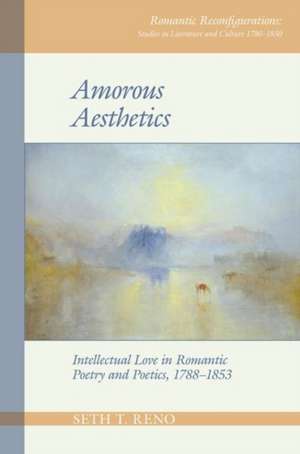Amorous Aesthetics – Intellectual Love in Romantic Poetry and Poetics, 1788–1853
Autor Seth T. Renoen Limba Engleză Hardback – 26 mar 2019
under-studied and under-appreciated, often neglected or dismissed as idealized, illusory, or overly sentimental. However, Seth Reno shows that a particular conception of intellectual love is interwoven with the major literary, scientific, and philosophical discourses of the period. Romantic-era
writers conceived of love as integral to broader debates about the nature of life, the biology of the human body, the sociology of human relationships, the philosophy of nature, and the disclosure of being. Amorous Aesthetics traces the development of intellectual love from its first major expression in Baruch Spinoza's Ethics, through its adoption and adaptation in eighteenth-century moral and natural philosophy, to its emergence as a Romantic tradition in the work of six major poets. From William
Wordsworth and John Clare's love of nature, to Percy Shelley's radical politics of love, to the more sceptical stances of Felicia Hemans, Alfred Tennyson, and Matthew Arnold, intellectual love is a pillar of Romanticism.
Preț: 749.74 lei
Preț vechi: 939.39 lei
-20% Nou
Puncte Express: 1125
Preț estimativ în valută:
143.46€ • 156.32$ • 120.89£
143.46€ • 156.32$ • 120.89£
Carte indisponibilă temporar
Doresc să fiu notificat când acest titlu va fi disponibil:
Se trimite...
Preluare comenzi: 021 569.72.76
Specificații
ISBN-13: 9781786940834
ISBN-10: 1786940833
Pagini: 256
Dimensiuni: 168 x 240 x 18 mm
Greutate: 0.54 kg
Editura: Liverpool University Press
ISBN-10: 1786940833
Pagini: 256
Dimensiuni: 168 x 240 x 18 mm
Greutate: 0.54 kg
Editura: Liverpool University Press
Notă biografică
Seth T. Reno is Associate Professor of English at Auburn University at Montgomery. He is co-editor (with Lisa Ottum ) of Wordsworth and the Green Romantics: Affect and Ecology in the Nineteenth Century (University of New Hampshire Press, 2016).
Descriere
Amorous Aesthetics traces the development of intellectual love from its first major expression in Baruch Spinoza's Ethics, through its adoption and adaptation in eighteenth-century moral and natural philosophy, to its emergence as a Romantic tradition in the work of six major poets.
